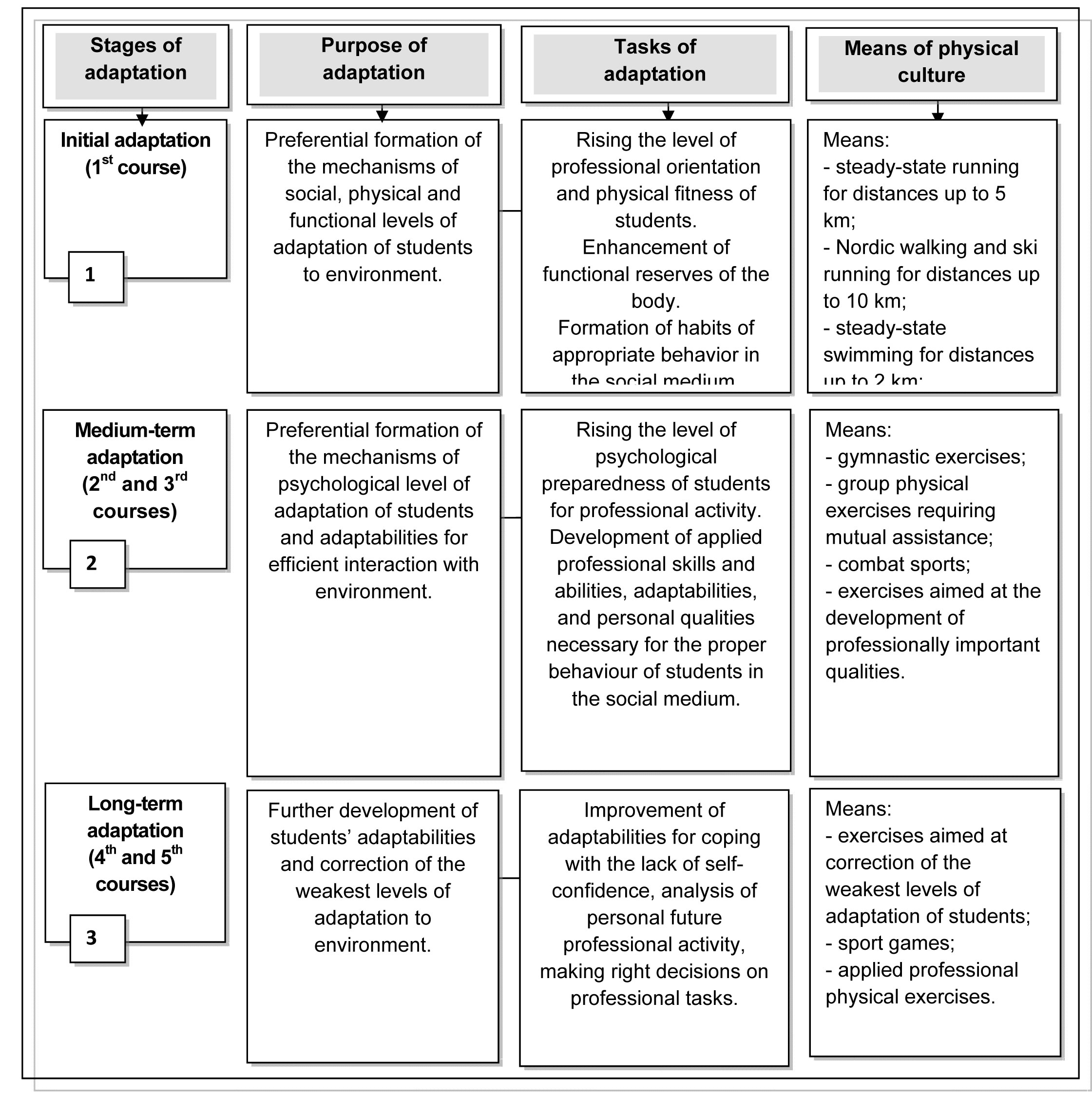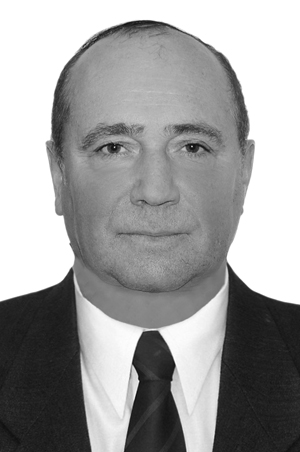Educational Technology of Use of Means of Physical Culture to Adapt for Future Professional Work
Фотографии:
ˑ:
A.E. Bolotin, professor, Dr.Hab., Honored worker of higher school RF
V.A. Schegolev, professor, Dr.Hab., Honored worker of higher school RF
V.V. Bakaev, Ph.D.
St. Petersburg State Polytechnic University, St. Petersburg
Key words: educational technology, adaptation, professional activity, universities, students, means of physical culture.
Relevance. Adaptation of students to professional work during their university studies depends mainly on the applied methods of physical culture. Adaptation can be considered successful if students' professional, physical and personal qualities needed for effective professional work are developed on a high level [1]. Moreover, this process should be aimed at achieving a sustainable mental preparedness to act in unusual life conditions after graduation [2-5].
Today there are several approaches to improve adaptation of students during their university studies. In this period students accumulate a certain information base regarding the conditions of their future work. The mechanisms of adaptation to future professional work that affect students' cognitive behavior are being formed [1].
Students' cognitive behaviour can be active or passive. Active cognitive behaviour is characterized by the desire to collect all possible information about the future work conditions. In such conditions strong-mindedness regarding preparation for new conditions of activity is shown. Passive behaviour of students is characterized by neutral perception of the information received. In this case, only that information is acquired, which corresponds to the internal expectations of an individual. As practice shows the activity of students’ behavior can be influenced by means of physical culture.
The purpose of the research was to develop and prove experimentally the educational technology of using means of physical culture to adapt students for future professional work.
Materials and methods. Adaptation has a mobilizing effect when students are relatively confident in themselves, in their forces and capabilities. Otherwise, stress grows on the background of increased anxiety accompanied by negative feelings. This has a negative impact on the subsequent stages of students’ adaptation to future professional activity.
Thus, one can conclude that the main psychogenic influence on a graduate’s personality is exerted by the conditions of university studies and by the specificity of future professional activity.
The consciousness of university students is affected by adverse factors, that negatively impacts their adaptation. Their stress increases, that has a negative effect on future professional work. Sometimes it leads to aggressive behavior, which can seriously aggravate the student’s situation under the conditions of university studies and does not contribute to student’s succesfull adaptation. There is another type of behavior as well. This type differs from the aggressive one by “escape” from a situation. Depression is typical for this type. In such cases, the student finds himself unable to influence the situation he is in.
Successful or insufficiently successful adaptation to the conditions of study and future professional work is determined by using various means of physical culture. These means can differ in the extent and mode of their impact on the mental and functional components of adaptation. They can help in forming the following conditions:
- social preparedness and orientation of an individual to future professional activity, interest in learning, necessary moral and psychological personal qualities;
- wilingness of students to master professional knowledge, skills and abilities;
- good health, physical and functional state.
Means of physical culture contribute to the recovery of physical, emotional and mental resources of students during their university studies.
Thus, the guarantee of successfull future professional work of university graduates is the formation of their professional and personal qualities during university studies, using means of physical culture.
As practice shows, the main goals of using means of physical culture for adaptation to professional activity are the following:
- involvement of students in the real physical culture and sports activity;
- development of students’ objective criteria for evaluation of their physical preparedness for professional work during university studies;
- compliance with the sequence of stages of formation of mechanisms of adaptation to future professional activity.
The development of an educational technology of adaptation, in view of the above conditions, enables to prepare students for active protection from the negative effects of unfavorable factors of future professional activity.
Basing on the examined experience of professional training of university students and on the analysis of psychological and educational literature, the following contradictions were revealed:
- between the need to improve the process of students’ adaptation to university studies and future professional activity and insufficient development of the necessary adaptabilities;
- between the need to enhance students’ adaptation to educational and professional activities in a university and underdeveloped courseware for this process.
The educational technology of using means of physical culture for adaptation of students to future professional activity was developed in order to resolve the above contradictions (Fig.).
This educational technology comprises three stages.
At the first stage of “initial adaptation” mostly students’ mechanisms of social, physical and functional levels of adaptation to environment are formed. Steady-state running for distances up to 5 km, Nordic walking and ski running for distances up to 10 km, steady-state swimming for distances up to 2 km, sport games (futsal, basketball, tennis) should be applied at this stage.
At the second stage of “medium-term adaptation” the preference is given to the formation of the mechanisms of psychological level of adaptation of students and adaptabilities for efficient interaction with environment. Gymnastic exercises, group physical exercises requiring mutual assistance, combat sports and exercises aimed at the development of professionally important qualities should be applied for this purpose.

Fig. Educational technology of using means of physical culture for adaptation of students to future professional activity
At the third stage of “long-term” adaptation, further development of students’ adaptabilities and correction of the weakest levels of adaptation to environment takes place. The exercises aimed at correction of the weakest levels of students’ adaptation, sport games, high intensity applied professional physical exercises should be applied at this stage.
In this technology specific problems related to students’ personality development were solved on a staged basis. Students’ personalities were developed via qualitative changes in earlier formed attitudes and motives of behavior.
Results and discussion. An educational experiment was carried out in order to assess efficiency of the developed educational technology of using means of physical culture for adaptation of students to future professional activity. The results of this experiment have shown high efficiency of the developed educational technology of using means of physical culture for adaptation of students to future professional activity (Table 1). Students of the experimental group had more pronounced positive changes in the indicators of functional, psychological, social and physical components of adaptation to future professional activity.
Table 1. Comparative analysis of the level of adaptation to professional activity of students of the experimental (EG) and control (CG) group during the educational experiment (![]() ±m), in points
±m), in points
|
No. |
Adaptation indicators |
At the beginning of the educational experiment |
P |
At the end of the educational experiment |
P |
||
|---|---|---|---|---|---|---|---|
|
EG |
CG |
EG |
CG |
||||
|
1. |
Functional |
3.7±0.1 |
3.8±0.1 |
>0.05 |
4.3±0.1 |
3.9±0.1 |
<0.05 |
|
2. |
Psychological |
3.2±0.1 |
3.3±0.1 |
>0.05 |
4.3±0.1 |
3.7±0.2 |
<0.05 |
|
3. |
Physical |
3.5±0.1 |
3.7±0.1 |
>0.05 |
4.6±0.1 |
3.9±0.1 |
<0.05 |
|
4. |
Social |
3.6±0.2 |
3.7±0.2 |
>0.05 |
4.7±0.1 |
4.1±0.1 |
<0.05 |
|
5. |
Adaptabilities |
3.2±0.1 |
3.3±0.1 |
>0.05 |
4.6±0.1 |
3.8±0.1 |
<0.05 |
The adaptabilities of students of the EG were better developed too. These abilities were characterized by the following indicators:
– social preparedness, i.e. the level of development of personality orientation to future professional activity, interest in learning and in professional work, moral and psychological qualities, etc.;
– level of general theoretical and professional skills, necessary store of knowledge, skills and abilities;
– psychophysiological personality traits necessary for professional work: health, physical development and other psychophysiological characteristics.
Conclusions. The developed educational technology of using means of physical culture to adapt students for future professional activity contributed to enhancement of their university vocational training.
References
- Bolotin, A.E. Organizational and educational conditions necessary to adapt emergency security specialists to professional work during university studies / A.E. Bolotin, A.V. Tokareva, A.A. Pauls // Uchenye zapiski universiteta im. P.F. Lesgafta. – 2013. – № 10(104). – P. 23–28. (In Russian)
- Bolotin, A.E. Requirements for professional training of security emergency security specialists / A.E. Bolotin, V.S. Vasil'eva // Uchenye zapiski universiteta im. P.F. Lesgafta. – 2013. – № 6(100). – P. 15–21. (In Russian)
- Bolotin, A.E. The educational model of professional university training of emergency security specialists using service in volunteer fire brigades / A.E. Bolotin, V.S. Vasil'eva // Uchenye zapiski universiteta im. P.F. Lesgafta. – 2013. – № 2 (96). – P. 14–19. (In Russian)
- Bolotin, A.E. The model of physical training control in the army of Angola / A.E. Bolotin, A. Fernandes // Uchenye zapiski universiteta im. P.F. Lesgafta. – 2011. – № 9 (79). – P. 164–169. (In Russian)
- Panchenko, I.A. The educational model of physical fitness of personnel of mine-rescue departments / I.A. Panchenko, A.V. Volkov, A.E. Bolotin // Teoriya i praktika fizicheskoy kultury. – 2014. – № 2. – P. 32–34. (In Russian)
Corresponding author: a_bolotin@inbox.ru



 Журнал "THEORY AND PRACTICE
Журнал "THEORY AND PRACTICE